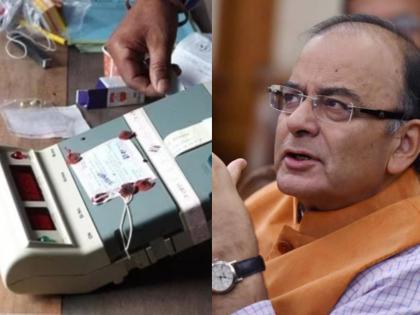Electoral Bonds Verdict: What Arun Jaitley's Has Said as SC Declares Them Unconstitutional
By Lokmat English Desk | Updated: February 15, 2024 12:13 IST2024-02-15T12:11:20+5:302024-02-15T12:13:02+5:30
On Thursday, 15 Feb 2024, the Supreme Court of India made a historic ruling, declaring the Electoral Bonds scheme ...

Electoral Bonds Verdict: What Arun Jaitley's Has Said as SC Declares Them Unconstitutional
On Thursday, 15 Feb 2024, the Supreme Court of India made a historic ruling, declaring the Electoral Bonds scheme in violation of the Right to Information Act under Article 19(1)(a). Chief Justice D Y Chandrachud, leading a five-judge Constitution bench, delivered the judgment, putting an end to the long-standing debate over anonymous funding to political parties. However, in 2019, the then Finance Minister Arun Jaitley defended the electoral bond scheme, stating that it aimed to curb the use of black money for funding elections, as was intended through electoral trusts proposed during the UPA-II regime.
Jaitley also mentioned that both the electoral trusts proposed by the then finance minister Pranab Mukherjee in 2010 and electoral bonds ensured complete transparency with white money but concealed the link between the donor and the party.
Finance Minister Arun Jaitley On need for Electoral Bonds.
On 7 January 2018, India is the world's largest democracy. However, despite strengthening various institutions for the last seven decades, India has not been able to evolve a transparent political funding system. Elections and political parties are a fundamental feature of Parliamentary democracy. Elections cost money. The year-round functioning of the political parties involves significant expenditure. Parties maintain offices across the country. Staff salaries, travel expenses, and establishment costs are regular expenditures of political parties. There has not been a single year where elections, either for the Parliament or State Assemblies, have not been held. In addition to the expenditure of individual candidates, political parties have to spend money on election campaigns, publicity, tours, travels, and election-related establishments. These expenditures run into hundreds of crores. Yet there has not been a transparent funding mechanism for the political system.
A major step was taken during the first NDA Government led by Shri Atal Bihari Vajpayee. The Income Tax Act was amended to include a provision that donations made to political parties would be treated as expenditure and would thus give a tax advantage to the donor. If the political party disclosed its donations in a prescribed manner, it would also not be liable to pay any tax. A political party was expected to file its returns both with the income-tax authorities and the Election Commission. It was hoped that donors would increasingly start donating money by cheque. Some donors did start following this practice, but most of them were reluctant to disclose the details of the quantum of donation given to a political party, the former Finance Minister had said.
Open in app